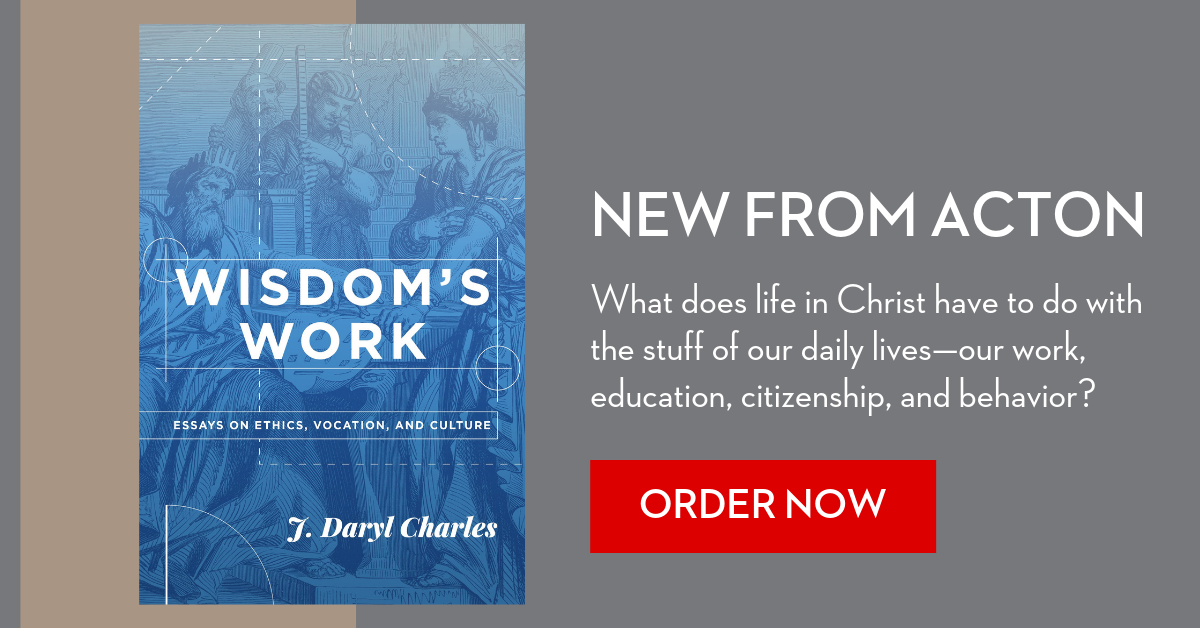Economic issues entail first and foremost a stewarding of resources. To properly understand this task, we must begin with the doctrines of creation and providence. Our mandate, based on creation (which has not been overturned or altered), is that we co-create (with God, based on the imago Dei, his likeness); that we develop, shape, and extend what God has called into being. Therein we utilize the endless and varied resources that he has placed at our disposal, in addition to our personal gifts and abilities. Principles of stewardship, it needs to be emphasized, flow from and are anchored in the doctrine of creation. According to the Genesis narrative, humankind is to develop as coregents all that God has created.
Principles of stewardship, furthermore, also derive from the doctrine of divine providence, by which we understand that all things are sustained continually by the Sovereign Lord God Almighty, the Creator. This process -- what theologians call the period of the “already but not yet” (accomplished through the cross and resurrection but awaiting total fulfillment) -- finds its consummation in the eschaton, at which time creation is not simply thrown on a cosmic ash heap but rather continues, though transformed. The new heavens and new earth mirror the fact that what has been called into existence by the Creator does not cease to be; rather, it continues, albeit in a transformed and glorified state. The reality of the doctrines of creation and providence undergird the important -- though neglected -- doctrine of judgment according to works. This doctrine neither plays on the Catholic tendency toward justification through works nor the Protestant tendency to neglect the importance of our earthly works.
Rather, it underscores the economic principle of stewardship. But I get ahead of myself.
Economic issues entail first and foremost a stewarding of resources
Important New Testament texts that underscore the reality of Christ as both creator and redeemer need mentioning. It is astonishing how stereotypical Christian teaching and preaching utterly misses the ramifications of both creation and redemption. The writer to the Hebrews notes, in his introduction, that the Son is the Wisdom’s Work “appointed heir of all things,” and that this Son “made the universe” and “sustains all things by the word of his power” (Heb. 1:2–3). Paul, in his introduction to the letter written to Christians in Ephesus, writes that, “in the fulness of time,” “all things whether in heaven or on earth” were “reconciled” to Christ (Eph. 1:10). And the magisterial New Testament text, also Pauline, is found in Colossians 1, where the apostle declares that by the Son all things were created in heaven and on earth—the material and the nonmaterial, the visible and invisible—and that not only were all things created through him but for him. As if that were not enough, in the same periscope Paul repeats this staggering truth: all things have been reconciled to Christ (vv. 16–20).
What is typically absent from contemporary teaching and preaching is a fuller awareness of the ramifications of the doctrine of incarnation. Consider how the Creator interacts with -- and transforms -- his own creation, noted in the prologue to the Fourth Gospel: “In the beginning was the Word, and the Word was with God, and the Word was God.… Through him [i.e., the “Word”] all things were made; without him nothing was made that has been made” (John 1:1–3 NIV). Let us consider these remarkable pronouncements. The “Word” (i.e., the Logos, which can legitimately be translated “word,” “communication,” “reason,” or “logic”) was divine, God himself. Moreover, that “Word” was incarnated; he “became flesh and made his dwelling among us,” we read a few verses later (v. 14 NIV). As the enfleshment of the Creator, the “Word” continues to advertise himself in the world that he himself created.
The question I would like to pose is this: By what standards does he advertise himself in the world that he himself created? Are we not exceedingly glad that God did not communicate in a second-rate way? He gave his best. And we should too, incarnating his life in our cultural surroundings. Furthermore, God is the “Word,” the master communicator. Where, we may ask, are Christians who aspire to become journalists, writers, policy writers, and gatekeepers in our contemporary world? Based on my three decades of teaching mostly in a Christian liberal arts environment, I am sad to say that relatively few seem motivated to go into these strategic realms of influence. To reiterate: God incarnate is first and foremost the Logos, the Word, the master communicator. Let us, having grasped his incarnate nature, be excellent communicators in and to the world. This understanding of incarnation is central to a right understanding of stewardship. Stewarding of creation, then, and stewarding of the culture in particular lies at the heart of economics, and the doctrines of creation, providence, redemption, and incarnation anchor this stewarding. Not surprisingly, the notion of stewardship surfaces in our Lord’s teaching and specifically in his use of the wisdom tradition and parables. Very briefly, I would like us to consider one of those parables, commonly referred to as the parable of the talents, found in Matthew 25.
Before we do, however, a quick word is in order on the rules of parabolic teaching and storytelling in the ancient wisdom tradition and in wisdom literature. First, parables arise from daily, real-life situations, unlike allegories; they represent personal encounters with people in typical situations, challenging the hearer in ways that abstract talk simply does not. Second, they always involve contrast, pitting the wise against the foolish, virtue against vice, or similar. Third, they almost always employ the rule of the three -- for example, three travelers in the parable of the good Samaritan, three excuse makers in the parable of the great supper, and in our case three stewards who are given various “talents” and realms of investment. Fourth, they follow the rule of climax, whereby the spotlight falls on the last person or action (as is especially the case in the parable of the talents). And finally, parables always strike for a verdict, seeking to evoke a response, such as “What do you think?” or “He who has ears to hear, let him hear” or “See, judge for yourselves.”
With this, let us consider the parable of talents itself (Matt. 25:14–30). In New Testament times, it should be noted that a talent was a unit of coinage and meant a lot of money. In present-day value, a talent would be worth much. The five-talent person might be worth anywhere between $25,000 and $250,000; the two-talent person between $10,000 and $100,000 dollars; and the one-talent person between $5,000 and $50,000 dollars, depending on how the stock market and local economies are acting. The precise amounts do not matter, however, and are only illustrative, since the parable is about faithfulness as a steward, not simply finance.
If we consider the parable through the eyes of the wisdom technique being used by Jesus, any number of lessons strikes us as relevant and applicable:
- The master gives differing gifts; human beings as stewards have different talents; and note the language: the master calls them and entrusts to them -- he puts them in charge of -- various realms. The same is true of God.
- The master goes away for an extended, unspecified time; the servants do not know when he will return, but it is assumed that his return is not imminent.
- What matters is not the gift or talent per se or the number; what matters is how the steward uses it.
- The master does not require from a person what that person does not possess; what he does require is that each person use to the fullest the talent and ability that have been given. The same is true of God.
- Serving is the guiding motivation for use of the various gifts and talents; serving is the essence of being a steward.
- Two of the three stewards receive commendation and rewards for their work or service that is “well done”; this indicates that the master himself receives great joy when investments are made, and it suggests a doctrine of accountability and rewards. God both receives great joy and rewards people accordingly.
- Part of that reward is being given more work or more responsibility; to those who have been faithful in investing, more is given.
- No investing or multiplying of our abilities or talents -- that is, no act of stepping out in faith -- displeases the master; what does displease him is an unwillingness to take risk and invest. The same might be applied to God.
- The third steward clearly is worried about risk, change, and liability; interestingly, he has a distorted view of the master and consequently does nothing. Many people have a distorted view of God.
- This one-talent steward did not “lose” his gift during the master’s absence; he simply did nothing with it, which resulted in the master’s displeasure.
- To not use or “invest” what has been given is, in the end, to lose it, however, and this is the note on which the parable concludes.
Faithfulness in the small leads to faithfulness in the greater
What we might say of this parable is that, far from being a harmless or entertaining story, it is a spear thrust into the side of the hearer, so to speak -- or a punch in the face -- because of the truth that it bears. It asks of the listener not how much do you have? But what are you doing with what you have been given? While it is true that human beings are created equal in terms of their worth and dignity, not all are equal in terms of their motivation, resolve, taking initiative, willingness to take risk by faith, and desire to serve.
The stewardship lessons that the parable of the talents teaches are many (and doubtless other readers of the parable will detect things in it that I do not). But all these lessons are expressions of a central law in the universe—a law that is as true and constant as the law of gravity. It is the law of sowing and reaping. We reap what we sow. This is true in both the material and the spiritual world, in economics and morality, in private and public life; there is simply no avoiding this law. Permit me to note its corollary: faithfulness in the small leads to faithfulness in the greater. Consider the converse as well: Unfaithfulness in the small will result in unfaithfulness in the greater. If someone cannot be entrusted with smaller entities, goods, or wealth, how can he or she be entrusted with greater responsibilities or greater wealth? It should be remembered that the loss confronting the unwilling steward in the parable of the talents is not merely a threat; it is a material and spiritual law. That is, if we neglect using our gift, it will vanish, disappear. The implication is that in not investing our talent in God’s service we must live with the torment of knowing that we wasted or depreciated the gifts God has given. At minimum, then, the parable behooves us to respond, and with wisdom, courage, and supreme energy to invest what God has entrusted to us.




